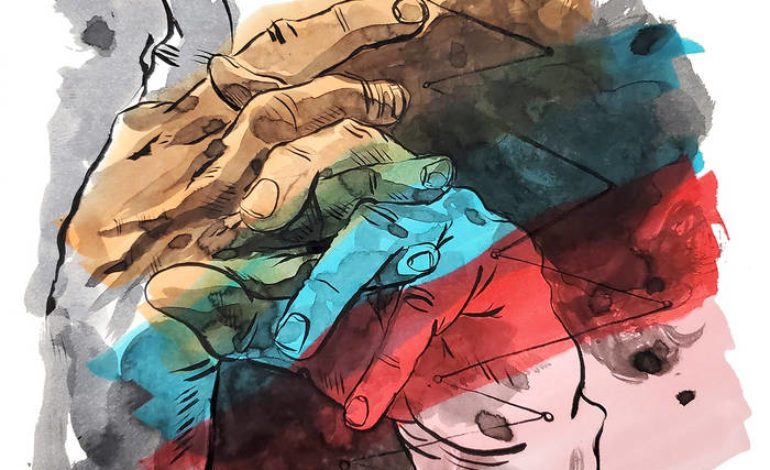

Divisive by design, but could be improved
Nihilism is becoming a pervasive theme in music, especially underground music. It’s easy to see why, given the current political and social climate, but it’s a difficult theme to get right or make interesting—since it’s so widespread, it can get old really fast.
Anti-folk, which takes the hope and pure spirit of folk music and warps it through a carnival fun-house mirror, tends to feature a lot of this emotion, interlaced with irony to further alienate anyone not indoctrinated into the mindset. But if anyone in the genre has earned the right to be a little depressed, it’s Darrin Bradbury. He’s struggled with OCD, PTSD and with getting any respect in an industry determined to squash his creativity. There’s no denying his distinct vision, but the heart and vulnerability don’t come through as often as they could. He seems content with merely hovering above the misery without diving into details and mining something personal that would make Artvertisement stand out from the dozens of other sardonic critiques of capitalism and fame.
Artvertisement is Bradbury’s most electric affair to date. Along with his thematic disconnect from folk, his musical palette has never fit the template either, with a lot of odd synthesizers and saloon piano. Bradbury expands this on tracks like “XXY Top Left,” with scuzzy guitars in the vein of Sonic Youth and other indie bands, plus some more major key pop-rock on “Exile on Myrtle Beach.” Sadly, these tones are often relegated to the back of the mix.
“The Wedding Song,” the bounciest track, is full of weedy guitars, even as the song builds to a surging crescendo. The warbling keys and bubbling textures robs these songs of their warmth, even if they’re intriguing and seldom repeated. “Mikey Shoulda Died” could’ve been a fantastic closer with its intimate acoustics and sparse production, but a final sledgehammer of distorted electric notes and raucous drums bring this pleasant musical palette to a halt.
However, the most contentious aspects of Artvertisement are Bradbury’s delivery and his lyrical blend of nihilism and irony. There are clever and thought-provoking lines, especially on the second verse of “Those Beautiful Days,” in which he muses about the literal and figurative death of his favorite literary characters and acknowledges that “most are just swallowed by time,” but his vocals don’t do justice to the writing, rendering it cold and distant.
Bradbury is clearly indebted to the Magnetic Fields–“The Wedding Song” sounds like his stab at making the “Book of Love pt. 2″–especially in his flat delivery. He rarely utilizes layering or multi-tracking, and any background vocals he gets are out-of-place, from the pub rock cheering of “Exile on Mrytle Beach” to the trade-off on “Mikey Shoulda Died,” where each vocal track sounds like it was recorded on a different continent. It’s a shame because the harmonies on that song are the best on the record, along with those on “Shiny Town” and the otherwise insufferable “Busted World.”
The biggest issue with this album is most apparent on “Shiny Town.” Over an upbeat piano on the bridge, Bradbury delivers lines like the voiceover at the end of a PSA, nearly slipping into spoken word with a condescending tinge, warning about the dangers of the American dream. Plenty of great art has been made about this subject, but Bradbury sounds like a narrator delivering lines about someone the listener never meets, which is is a problem because the best kind of political or social commentary requires some element of humanity. Thus, the most interesting songs on Artvertisement feature less sloganeering and more sincerity.
“Pizza & Drugs,” for instance, is a stoner love song about getting through life’s malaise with simple hedonism, boasting a mix that balances hope and despair with warm pianos and a cool, undulating melody. “Deanna, Deanna” leans more toward rock, with Bradbury delivering an ode to his sister while also bragging about being a rock star (but not really) and getting a check with some zeros in it, all while trying to laugh to keep from crying. It’s as ironic as the other tracks, but it leverages it into something that feels human and conversational, with Bradbury’s guarded optimism more palpable than ever.
There are plenty of listeners who will identify with lines like, “I was born in a busted world,” and “I went to the shiny town, and I didn’t get nothing/ but a busted boot and a cardboard crown.” But sadly, Artvertisement is just another entry into an already crowded and disgruntled genre, and its sense of distance and disjointedness ultimately distracts from the more impactful, sincere and strongest moments.
